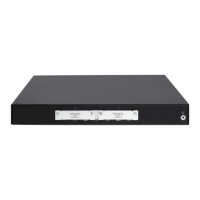197
Configuring load sharing
If a routing protocol finds multiple equal-cost best routes to the same destination, the device
forwards packets over the equal-cost routes to implement load sharing.
Command and hardware compatibility
Commands and descriptions for centralized devices apply to the following routers:
• MSR1002-4/1003-8S.
• MSR2003.
• MSR2004-24/2004-48.
• MSR3012/3024/3044/3064.
• MSR954(JH296A/JH297A/JH298A/JH299A/JH373A).
• MSR958(JH300A/JH301A).
Commands and descriptions for distributed devices apply to MSR4060 and MSR4080 routers.
Configuring per-packet or per-flow load sharing
Load sharing can be implemented in one of the following ways:
• Per-packet—The device forwards packets over equal-cost routes.
• Per-flow—The device forwards flows over equal-cost routes. Packets of one flow travel along
the same routes. You can configure the device to identify a flow based on the following criteria:
source IP address, destination IP address, source port number, destination port number, IP
protocol number, and ingress port.
In a complex network, when the five tuples cannot distinguish flows, you can use the algorithm
keyword to specify an algorithm to identify flows.
To configure per-flow or per-packet load sharing:
Step Command Remarks
1. Enter system view.
system
-
view
N/A
2. Configure load sharing.
• Centralized devices in standalone mode:
ip load-sharing mode per-flow
[ dest-ip | dest-port | ip-pro | src-ip |
src-port ] * global
• Distributed devices in standalone
mode/centralized devices in IRF mode:
ip load-sharing mode per-flow
[ dest-ip | dest-port | ip-pro | src-ip |
src-port ] * { global | slot slot-number }
• Distributed devices in IRF mode:
ip load-sharing mode per-flow
[ dest-ip | dest-port | ip-pro | src-ip |
src-port ] * { chassis chassis-number
slot slot-number | global }
By default, the device
does not perform load
sharing.

